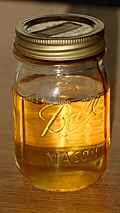
Back تربنتين Arabic Шкіпінар BE Терпентин Bulgarian Terpentin BS Trementina Catalan Terpentýn Czech Terpentin Danish Terpentin German Τερεβινθέλαιο Greek Aguarrás Spanish
 Turpentine distilled at the Georgia Museum of Agriculture & Historic Village as it was done circa 1900
| |
| Identifiers | |
|---|---|
| ECHA InfoCard | 100.029.407 |
| EC Number |
|
PubChem CID
|
|
| UNII | |
CompTox Dashboard (EPA)
|
|
| Properties[1] | |
| C10H16 | |
| Molar mass | 136.238 g·mol−1 |
| Appearance | Viscous liquid |
| Odor | Resinous |
| Melting point | −55 °C (−67 °F; 218 K) |
| Boiling point | 154 °C (309 °F; 427 K) |
| 20 mg/L | |
| Hazards | |
| NFPA 704 (fire diamond) | |
| Flash point | 35 °C (95 °F; 308 K) |
| 220[1] °C (428 °F; 493 K) | |
Except where otherwise noted, data are given for materials in their standard state (at 25 °C [77 °F], 100 kPa).
| |
Turpentine (which is also called spirit of turpentine, oil of turpentine, terebenthine, terebenthene, terebinthine and, colloquially, turps)[2] is a fluid obtained by the distillation of resin harvested from living trees, mainly pines. Principally used as a specialized solvent, it is also a source of material for organic syntheses.
Turpentine is composed of terpenes, primarily the monoterpenes alpha- and beta-pinene, with lesser amounts of carene, camphene, limonene, and terpinolene.[3]
Substitutes include white spirit or other petroleum distillates – although the constituent chemicals are very different.[4]
- ^ a b Record of Turpentine in the GESTIS Substance Database of the Institute for Occupational Safety and Health
- ^ Mayer, Ralph (1991). The Artist's Handbook of Materials and Techniques (Fifth ed.). New York: Viking. p. 404. ISBN 0-670-83701-6.
- ^ Kent, James A. Riegel's Handbook of Industrial Chemistry (Eighth Edition) Van Nostrand Reinhold Company (1983) ISBN 0-442-20164-8 p.569
- ^ "Solvents". Ullmann's Encyclopedia of Industrial Chemistry. Weinheim: Wiley-VCH. 2002. doi:10.1002/14356007.a24_437. ISBN 978-3527306732.
